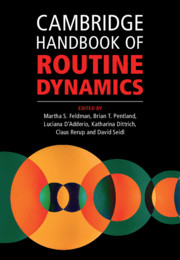Book contents
- Cambridge Handbook of Routine Dynamics
- Cambridge Handbook of Routine Dynamics
- Copyright page
- Contents
- Figures
- Tables
- Contributors
- Preface
- Chapter 1 What Is Routine Dynamics?
- Part I Theoretical Resources for Routine Dynamics Research
- Part II Methodological Issues in Routine Dynamics Research
- Chapter 8 Ethnography and Routine Dynamics
- Chapter 9 Video Methods and Routine Dynamics
- Chapter 10 Field Experiments and Routine Dynamics
- Chapter 11 Agent-Based Modelling in Routine Dynamics
- Chapter 12 Sequence Analysis in Routine Dynamics
- Chapter 13 Narrative Networks in Routine Dynamics
- Chapter 14 Bakhtin’s Chronotope and Routine Dynamics
- Part III Themes in Routine Dynamics Research
- Part IV Related Communities of Thought
- Author Index
- Subject Index
- References
Chapter 11 - Agent-Based Modelling in Routine Dynamics
from Part II - Methodological Issues in Routine Dynamics Research
Published online by Cambridge University Press: 11 December 2021
- Cambridge Handbook of Routine Dynamics
- Cambridge Handbook of Routine Dynamics
- Copyright page
- Contents
- Figures
- Tables
- Contributors
- Preface
- Chapter 1 What Is Routine Dynamics?
- Part I Theoretical Resources for Routine Dynamics Research
- Part II Methodological Issues in Routine Dynamics Research
- Chapter 8 Ethnography and Routine Dynamics
- Chapter 9 Video Methods and Routine Dynamics
- Chapter 10 Field Experiments and Routine Dynamics
- Chapter 11 Agent-Based Modelling in Routine Dynamics
- Chapter 12 Sequence Analysis in Routine Dynamics
- Chapter 13 Narrative Networks in Routine Dynamics
- Chapter 14 Bakhtin’s Chronotope and Routine Dynamics
- Part III Themes in Routine Dynamics Research
- Part IV Related Communities of Thought
- Author Index
- Subject Index
- References
Summary
The development of routine dynamics entails both a theoretical shift and changes in methodology. Agent-based modelling (ABM) offers an approach to enriching our understandings of routine dynamics from the ‘bottom-up’. This chapter provides an overview of ABM methodology in routine dynamics research. It includes a comparison of the eleven contemporary agent-based models (ABMs) selected from literature, a summary of research challenges and reflections on future work. As this chapter shows, we can differentiate ABMs in routine dynamics based on levels of analysis and concrete research questions. Further, developing empirically grounded ABMs will be a challenging but worthwhile effort.
Information
- Type
- Chapter
- Information
- Cambridge Handbook of Routine Dynamics , pp. 159 - 171Publisher: Cambridge University PressPrint publication year: 2021
References
Accessibility standard: Unknown
Why this information is here
This section outlines the accessibility features of this content - including support for screen readers, full keyboard navigation and high-contrast display options. This may not be relevant for you.Accessibility Information
- 1
- Cited by
